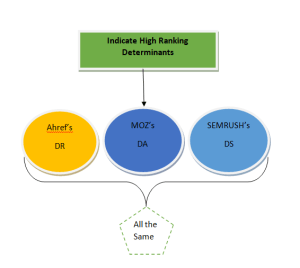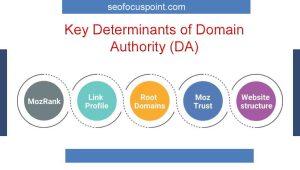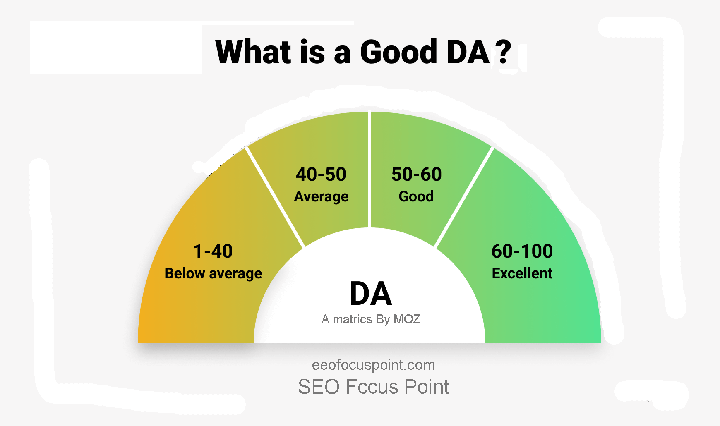Table of Contents
Table of Contents
What is Domain Authority(DA)?
To understand What is good domain authority(DA) you have to know what is Domain Authority. Domain authority is a metric that indicates the overall strength and authority of a website’s domain name. It was created by Moz, an SEO software company, and is calculated based on factors such as the number and quality of backlinks pointing to a website, the age of the domain, and the overall trustworthiness of the site.
Different SEO Industries Called it by Different names but the calculation is the same. For Example:
- Ahrefs Called it Domain Rating (DR).
- Moz Called it Domain Authority (DA).
- SEMRUSH Called it Domain Score (DS).

The higher the domain authority of a website, the more likely it is to rank well in search engine results pages (SERPs) and attract organic traffic. Domain authority is scored on a scale of 1 to 100, with higher scores indicating a stronger and more authoritative website. It’s important to note that domain authority is a relative metric, and it should be used in comparison to other websites in the same industry or niche.
What is Good Domain Authority(DA)?
It’s difficult to define What is a good domain authority score, as what is considered good can vary depending on the industry, niche, and competition level. However, generally speaking, a DA score of 50 or higher is considered to be a good score, indicating that the website has a strong backlink profile and overall authority in its niche.
It’s important to keep in mind that Domain Authority is just one of many factors that can impact a website’s ranking on SERPs. A high DA score alone does not guarantee a high ranking on search engine results pages, as many other factors search engines take into account when determining the relevance and quality of a website’s content. To improve a website’s ranking on SERPs, it’s important to focus on creating high-quality, relevant content and building a strong backlink profile.
As we discussed before Domain Authority Scale is 1 to 100. Now can break down the total Points into three Segments.
- Scores below 40 are considered poor.
- Scores between 40 to 50 are considered to be average.
- Scores between 50 and 60 were rated as good.
- Scores above 60 rate the DA as excellent.
How to Check Your Website Domain Authority?
Knowing the Domain Authority (DA) of your website is crucial for understanding its search engine ranking potential. With the “Bulk DA PA Checker Tool” by GUESTPOSTLINKS, you can easily assess the DA of multiple websites simultaneously, streamlining your SEO efforts efficiently.
Using the Bulk DA PA Checker Tool
Access the Tool: Navigate to the “Bulk DA PA and spam checker” by GUESTPOSTLINKS on our website. The tool is designed for simplicity and efficiency, allowing users to analyze up to 20 URLs at once.
Enter URLs: In the provided input field, enter the URLs of the websites you wish to check for Domain Authority. You can input a single URL per line or paste a list of URLs, ensuring a quick and comprehensive analysis.
Initiate the Check: Once your URLs are entered, click on the “Check Authority” button to initiate the analysis process. Our tool swiftly processes the information and provides you with the Domain Authority (DA) and Page Authority (PA) scores for each URL you’ve submitted.
Interpreting the Results: Upon completion, the tool presents you with a detailed report showcasing the Domain Authority and Page Authority of the entered URLs. The DA score ranges from 0 to 100, with higher scores indicating stronger potential for ranking on search engine results pages (SERPs).
Utilize Insights: Armed with this valuable information, you can make informed decisions regarding your SEO strategy. Focus on building backlinks from high DA websites, identifying areas of improvement for your own site, and benchmarking against competitors.
Good for a New website
It’s common to have a low Domain Authority (DA) score since the website is relatively new and has not had the time to build a strong backlink profile. A DA score of 1 to 10 is not uncommon for a new website.
It’s important to focus on creating high-quality content, optimizing your website for search engines, and building a strong backlink profile over time to improve your DA score. It may take several months or even years to achieve a good DA score, depending on the competitiveness of your industry and the amount of effort and resources you invest in your SEO strategy.
While DA can be an important metric to track, it’s not the only factor that impacts your website’s search engine rankings and traffic. Focus on creating a strong foundation for your website’s SEO, and the DA score will improve over time as your website becomes more authoritative and trustworthy in the eyes of search engines.
Good for a Growing Website
In general, the 1-2-year-old domain may be called a growing website. For a website that is 1-2 years old, a good Domain Authority (DA) score would depend on various factors, such as the industry or niche, the competition, and the amount of effort invested in SEO.
In general, a DA score of 20-30 can be considered good for a website that is 1-2 years old, as it indicates that the website has been able to establish some level of authority and credibility in its niche. However, it’s important to note that DA is a relative metric, and it should be used to compare websites within the same industry or niche.
It’s also important to keep in mind that DA is just one of the many factors that impact a website’s search engine rankings and traffic. To improve your website’s overall SEO performance, you should focus on creating high-quality content, optimizing your website for search engines, building a strong backlink profile, improving user experience, and more. By implementing a comprehensive SEO strategy, you can improve your website’s DA score and attract more organic traffic over time.
Good for 5-6 Years Old Website
For the website whiches, the domain age is 5 to 6 years 40 to 50 domain authority is considered to be good but it also depends upon various factors that I mentioned above. Most of them are: What is your website niche? What is your spam score? quality of your backlinks. For example: If you have backlinks from 90+ DA websites, it will not equal less than 20 DA websites. So the quality of your pointing website is much more important than the quantity of the links you gained.
Several key determinants of Domain Authority(DA)
Domain Authority is a metric developed by Moz that measures the strength and authority of a website. It is based on various factors that contribute to a website’s overall authority and ranking potential. Here are some of the key determinants of Domain Authority:

- Linking Root Domains: The number of unique domains linking to your website is a crucial factor in determining your Domain Authority. The more high-quality and relevant websites that link to your site, the higher your Domain Authority is likely to be.
- Quality of Inbound Links: The quality of the websites linking to your site is just as important as the quantity. High-quality links from authoritative sites with relevant content and high Domain Authority can significantly boost your own Domain Authority.
- Content Quality and Relevance: The quality and relevance of your website’s content play a critical role in determining your Domain Authority. High-quality, original, and relevant content that engages your target audience can help establish your site as an authoritative source of information.
- User Engagement Metrics: User engagement metrics such as bounce rate, time on site, and pages per session can provide insight into how well your website engages and satisfies its audience. A high level of user engagement can help increase your Domain Authority.
- Site Age and History: The age and history of your website can also impact your Domain Authority. Established sites with a long history of providing high-quality content and attracting high-quality backlinks are likely to have a higher Domain Authority than new sites.
- Technical SEO: Technical factors such as website speed, mobile-friendliness, and site structure can also impact your Domain Authority. A website that is well-optimized for search engines and provides a smooth user experience is more likely to rank higher and have a higher Domain Authority.
- Social Signals: Social signals such as likes, shares, and followers on social media platforms can also influence your Domain Authority. While they may not directly impact your ranking, social signals can help increase brand awareness and drive traffic to your site, which can ultimately lead to higher Domain Authority.
Overall, Domain Authority is influenced by a complex combination of factors, and it is essential to focus on all these determinants to improve your website’s overall authority and ranking potential.
Specific Formula to Calculate Domain Authority
The specific formula used to calculate Domain Authority is not publicly disclosed by Moz, as it is based on their proprietary machine learning algorithm. However, it is known that the DA score is based on over 40 different factors, including the ones mentioned above.
Moz updates the DA scores of websites on a rolling basis, which means that the scores are updated regularly based on the most recent data available. It is worth noting that Domain Authority is not a metric used by search engines themselves, but rather an indicator of a website’s overall authority and ranking potential.
Google’s Response to Domain Authority
Google does not use Moz’s Domain Authority (DA) as a ranking factor for search results. Google has its own proprietary algorithm for ranking websites, which takes into account a multitude of factors such as content relevance, site speed, mobile-friendliness, user experience, and more.
Google’s algorithm is designed to provide the most relevant and high-quality search results to users, based on their search query and intent. Therefore, while having a high DA score may indicate that a website is authoritative and has a strong backlink profile, it does not necessarily mean that it will rank higher on Google search results.
Google has stated that the best way to improve your website’s ranking on their search results is to focus on providing high-quality content that meets the needs of your target audience, as well as improving technical aspects of your website such as site speed and mobile-friendliness. Additionally, building a strong backlink profile through relevant and high-quality links can also help improve your website’s authority and ranking potential on Google search results.
Some Responses from google professional
“Domain Authority is not a Google ranking factor and has no effect on the SERPs.”– In 2015, Gary Illyes, Chief of Sunshine and Happiness at Google, was asked about authority passing from HTTP to HTTPS.
“We don’t have “authority”, but signals should pass on, yes.”-In 2016, Illyes answered a question about whether adding or removing pages from a website affected its domain authority.
“We don’t really have ‘overall domain authority’. A text link with anchor text is better though”- From there, you will find many confirmations from John Mueller, Search Advocate at Google, that Domain Authority exists but that Google doesn’t use it.
Source: searchenginejournal
Is Domain Authority a Ranking factor?
Domain Authority (DA) is not a direct ranking factor used by search engines, including Google. Instead, DA is a metric developed by Moz that predicts how well a website is likely to rank on search engine result pages (SERPs) based on a number of different factors, such as the quality and relevance of the website’s content, the number and quality of backlinks, and other technical factors.
While DA is not a ranking factor used by search engines, it can still be a useful metric for website owners and digital marketers to evaluate the overall strength and authority of a website, as well as its potential to rank higher on SERPs. By focusing on improving the factors that contribute to DA, such as content quality, backlink profile, and technical SEO, website owners can work towards improving their website’s overall authority and ranking potential.
It’s worth noting that Domain Authority is not the only factor that affects a website’s ranking on search engine results pages. Search engines use a complex algorithm that considers a wide range of factors to determine the relevance and quality of a website’s content.
Some of the factors that can directly impact a website’s ranking on SERPs include:
- Content relevance and quality: Search engines place a high value on content that is relevant, informative, and high-quality. This means that websites that provide valuable information to users are more likely to rank higher on SERPs.
- Backlinks: Backlinks are links from other websites that point to your website. Search engines consider backlinks as a sign of authority and relevance, and the quality and quantity of backlinks can have a significant impact on a website’s ranking on SERPs.
- Technical SEO: Technical SEO refers to the technical aspects of a website that affect its performance and visibility on search engines. Factors such as site speed, mobile-friendliness, and site structure can impact a website’s ranking on SERPs.
- User experience: Search engines want to provide the best possible experience to their users, which means they prioritize websites that offer a good user experience. Factors such as site navigation, page load time, and overall usability can impact a website’s ranking on SERPs.
In summary, while Domain Authority can be a useful metric for evaluating a website’s overall authority and ranking potential, it is just one of many factors that can impact a website’s ranking on SERPs. By focusing on creating high-quality content, building a strong backlink profile, optimizing technical SEO, and providing a good user experience, website owners can improve their website’s ranking on search engine results pages.


7 thoughts on “What is a good domain authority?”